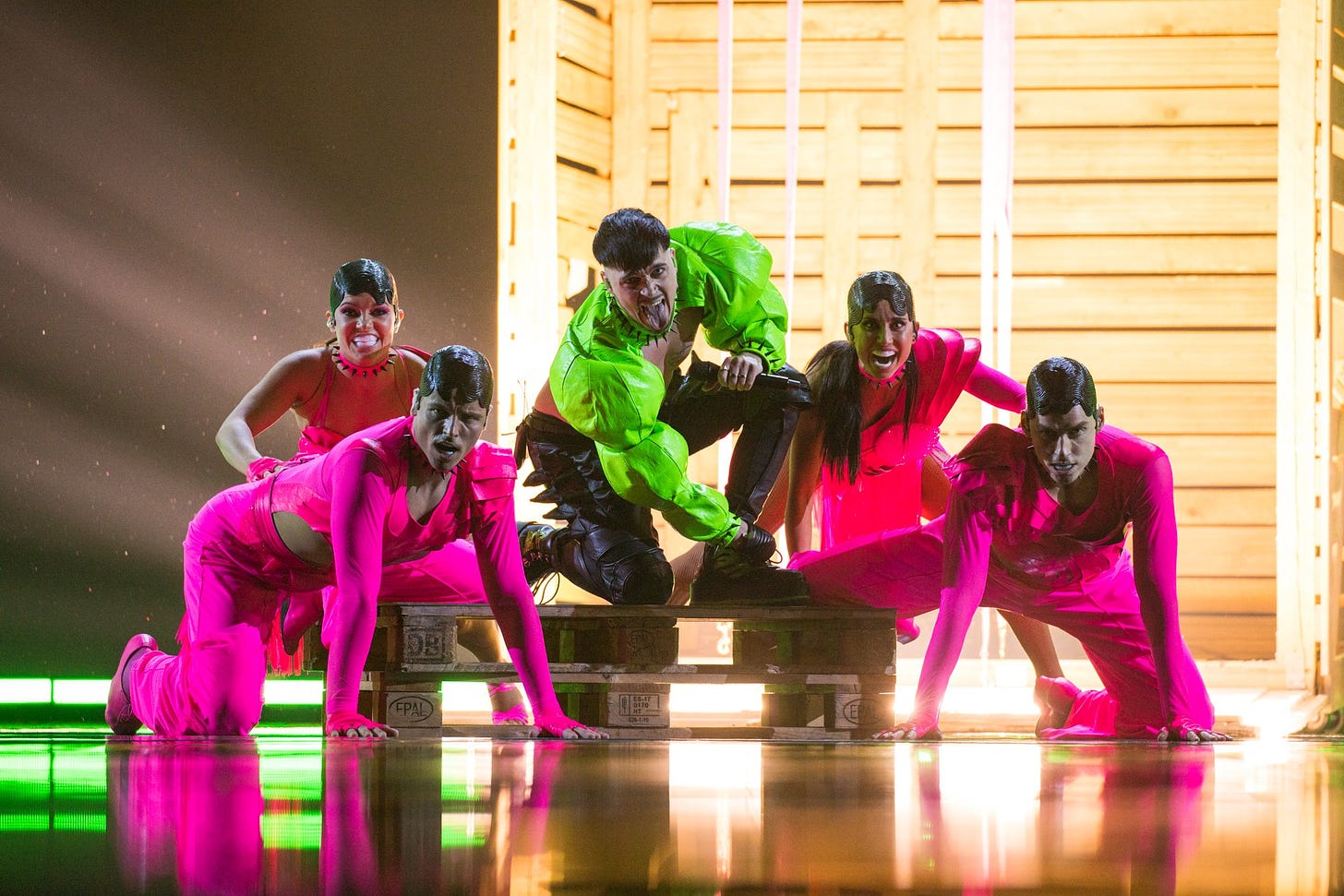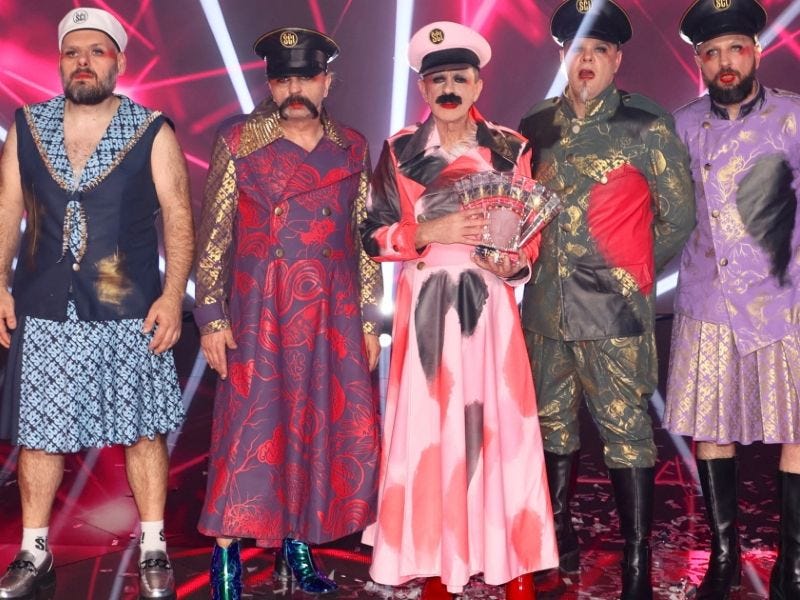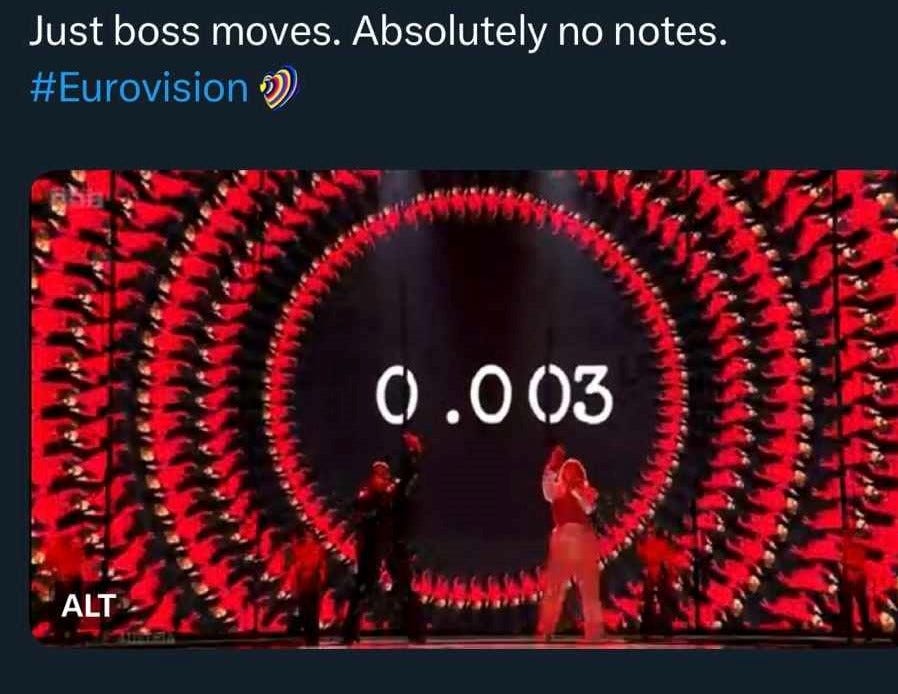Last week was the three-day extravaganza known as the Eurovision Song Contest, and for the first time it was easily accessible on US TV. On the first day of preliminaries, Mary texted me from Berlin to say, "It's about to start!" She needed me to tune in because the pleasure of Eurovision is friend, or at least, quip, dependent, and thanks to the miracle of group chat, that is fully possible even across continents and time zones. Alas, it was morning in America, so I was pretty much like, 'I do not have time for this,' but I accidentally turned it on, and it turned out that I did.
It sucks, but it sucks you in, and that's a fact. If you've ever been in actual Europe while it's on, you know: it's a spectator sport, like football, MMA, or the awful show "I'm A Celebrity Get Me Out of Here." It bills itself as being some kind of European unifying event, but among the other things it may or may not do, it proves my supposition that music should never be a contest, which is why I object to Top Ten and Year End lists and for the most part have lost faith in almost all forms of judging music, i.e. my former profession. Because of the vast amount of self-loathing that whole era of my life has created, watching it is a love/hate thing for me, as it forces me to contemplate the disjunction between music and entertainment, culture and politics.
EVS has been around since 1956. It was created by the European Broadcasting Union, a broadcasting network (i.e. distributor) which included Israel in its clients: that is why Israel, a non-European country, is allowed to compete, for those who are wondering. Originally it was an experiment in live transmission and only had 7 countries, but its popularity has grown exponentially over the years, turning it into the bizarre mix of trashy euro-pop and vernacular folk music with a super campy following that it is today.
One reason for its popularity may be that it is one of the very last events of its ilk that requires you to watch it in real time, because the voting period is in real time and in some weird way it feels like it actually matters who wins. The voting rules are too arcane for me to go over here, but viewers vote via text, and cannot vote for their own country. It used to be that the winner was determined solely by viewers but at some point they instituted a new, more complicated system that is supposed to make it less biased but which hasn't helped at all - just like with gymnastics and ice dancing in the Olympics.
Since all the music is pretty bad, the winner of Eurovision is usually decided by the popularity of the country, rather than the performer, and that opens to the door for all kinds of shenanigans. Unsurprisingly, Russia has been kicked out this year and it's nice to know that this probably hurts their feelings. Last year's winner was Ukraine, who got the sympathy vote from every country involved. The U.K. invariably does terribly because they are so politically wrongheaded all the time. And the Scandinavian countries have an unspoken alliance where they vote for one another, which always gives them an edge.
Speaking of which…if you watched, you know that this year's winner was Sweden, in the guise of a Moroccan-born Swede called Loreen who has actually won once before (in 2013), but that the popular vote went to Finland, who were far better, more campy, charming and catchy. I thought Loreen was awful, but only because I have an aversion to all the acts that wore body length leotards and opened their number by lying on the ground writhing. I counted 7 in all who did this, the most egregious being Israel with a song called "Power of a Unicorn," which is an unacceptably terrible lyric even for Eurovision. But Loreen’s song wasn’t far off. Also, as Mary said – or rather, texted – it was like Loreen’s fingernails were her backup dancers.
That's just personal taste, though; clearly lots of people like the lady solo acts, since one won. I preferred the band-type entities, like Finland, Australia, Slovenia, and Azerbaijan (although they were eliminated in the prelims.) I am also always happy to see the zany entries, beginning with Moldova’s entrant, which achieved peak Eurovision by featuring an actual dwarf. Germany’s entrant was an exceedingly silly heavy metal band called Lord of the Lost doing a song called "Blood and Glitter,” the lead singer was dressed like a giant bloody red tree, and you don’t need to know anything else, since the title says it all. Zaniest of all was Croatia's Let 3, a forty-year-old punk band known for its ties to antifascist organizations. Their song “SC” had the chorus “That little psychopath (W-w-war, war) Little, vicious psychopath (W-w-war, war) Crocodile psychopath (W-w-war, war), which is said to refer to Vladimir Putin.
All three of those acts tickled me pink, but the act I was rooting for was Austria. Not only was their song "Who the Hell is Edgar?" actually kind of a good song, but they flashed the number .003 on the screen behind them throughout to reference how little each stream will earn them.
So much for my preferences though. As I said: it's an opportunity for me to contemplate the woes of rock criticism, i.e., making music into a subjectively decided contest. It's also an opportunity to think about the problematic nature of voting. In the bubble world of Eurovision, the stakes are low, but what if the same standards (i.e. none) is used to decide something important?
Of course, the alternative to allowing people to vote for their preferences is too awful to contemplate, but the Eurovision Song Contest begs one to contemplate it, and doing that is how come it was the first paper I ever gave at an academic conference. I don't remember what I said about it, but I think it had something to do with its bizarre concept of Europe as a continent that needed to be both separate and unified, pitting its countries in a way that belies the stated purpose of the concert, which is to bring it together. I probably quoted Benedict Anderson's "Imagined Communities" and Dayan and Katz's “Media Events: The Live Broadcasting of History" because those were the two texts that I always quoted in academia before I started using "Capitalist Realism" instead.
In my original talk I argued that the media uses events like Eurovision to narrate a fictional vision of nationhood. Anderson argues that the modern nation is an imagined entity, created outside of the bounds of religion, language, and even geography, and he pinpoints the newspaper, which he calls "one-day best sellers," as the instrument of this creation. He says that it is only through the newspaper that "fiction seeps quietly and continuously into reality, creating that remarkable confidence of community in anonymity which is the hallmark of modern nations," and that seems true, even if you substitute televised events like this one for "the newspaper," since nationhood is of course key to the Eurovision Song Contest.
It is events like these that allow Europe to contemplate itself, and this is what it ses looking back at itself:
The other point about the Eurovision Song Contest is that it is a reminder of the power of the Live Media Event, or what Dayan and Katz call The High Holy Days of Broadcasting. These are events like royal weddings and funerals, the Moon Landing, and so on; events they call “world rituals.” Dayan and Katz claim that they have the power to transform society by cleaving it together, and the funny thing is that, even with all our new technologies that make it so we can watch stuff anywhere and anytime, the point still holds. If anything, as my group chat about Eurovision points out, new technologies only enhance the high holy days of broadcasting by making them higher and holier.







